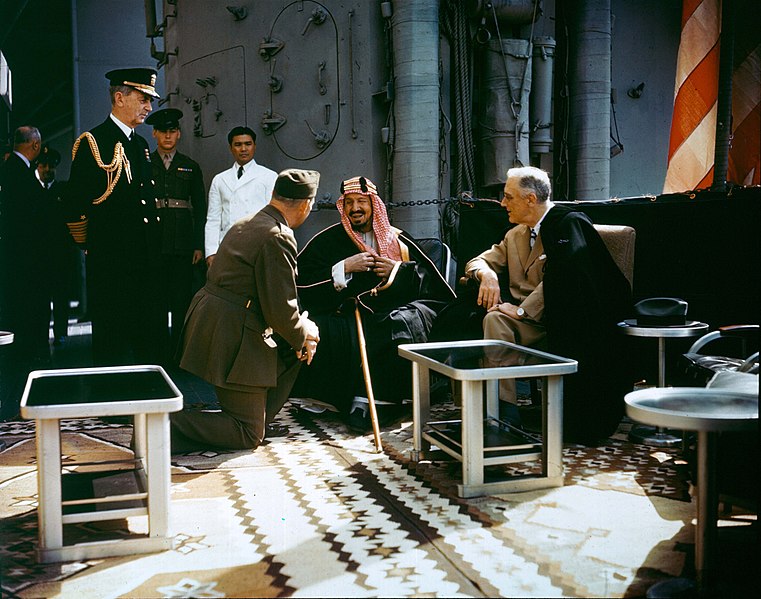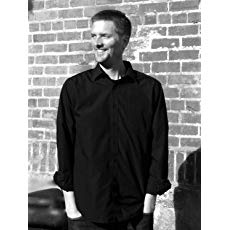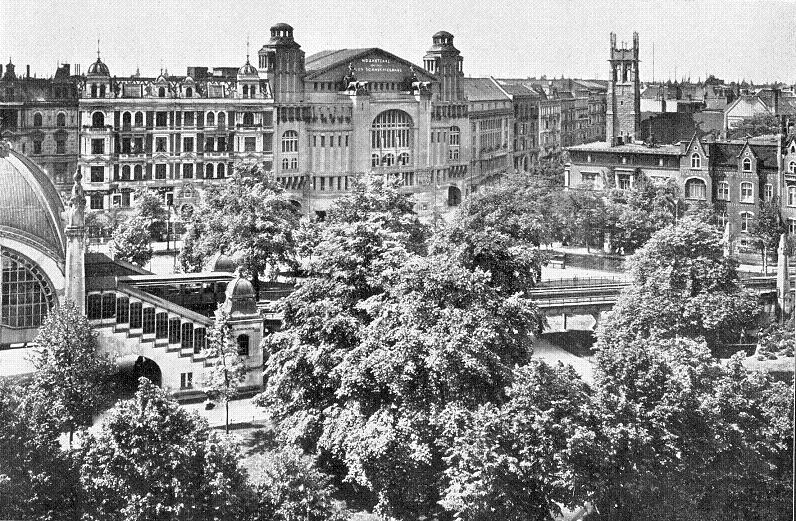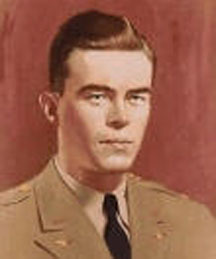ウィリアム・エディは、米国史上最も有能な公安調査官の一人だった。第二次世界大戦中、彼は米国初のスパイ組織である戦略諜報局(OSS)に創設メンバーとして加わり、戦後、CIAの設立にも貢献している。また、第一次世界大戦で勲章を授与された退役軍人、教育者、献身的な夫、父親でもあった。しかし、これらはどれもウィリアム・エディの真の姿を十分に映すものではない。(彼のことを表現するのに)最も大事なのは、彼が信仰者だったということだ。
[toggle]William Eddy was one of the most effective intelligence officers in American history. During World War II, he was among the first to join the Office of Strategic Services (OSS), the nation’s first permanent espionage agency. After the war, he helped found the CIA. He was also a decorated veteran of World War I and, in civilian life, an educator, devoted husband, and father. But none of those roles really captures the true William Eddy: Above all, he was a man of God. [/toggle]
ヤルタ会議の後、イブン・サウド・サウジ国王とフランクリン・ルーズベルト米大統領の会談で、左側にひざまずいて王と話しているのがエディ(写真:U.S. Navy)
エディは1896年、レバノンの長老派宣教師のもとで生まれた。中東で育った彼はアラビア語とフランス語を習得し、米国の短大に進学した。プリンストン大学で博士号を取得した後、宣教師が設立したカイロの米国系大学で英語を教え、やがてダートマス大学に移った。言語能力と、地域の内部事情に関する豊富な知識を買われ、エディは現代の米国スパイの創始者ウィリアム・ドノヴァン(別名「ワイルド・ビル」)によってOSSに採用された。エディは米国の手先として、連合軍による1942年の北アフリカ侵攻を成功させた。また45年に、米国・サウジ同盟が設立された会談では、フランクリン・D・ルーズベルト米大統領とイブン・サウド・サウジ国王の通訳も務めた。しかし、エディはどこにいても日曜日の礼拝を休むことは滅多になかった。
[toggle]Eddy was born in Lebanon in 1896 to Presbyterian missionaries. Raised in the Middle East, he became fluent in Arabic and French and went to college in the United States. After earning a doctorate from Princeton, he went on to teach English at the missionary-founded American University in Cairo and later at Dartmouth. With his linguistic abilities and insider’s knowledge of the region, Eddy was recruited to the OSS by William “Wild Bill” Donovan, the founding father of modern American espionage. Eddy became America’s man in the Middle East, helping make possible the Allied invasion of North Africa in 1942. He acted as an interpreter between President Franklin D. Roosevelt and Saudi King Ibn Saud at their meeting in 1945, which established the US-Saudi alliance. Yet no matter where he was, Eddy rarely missed a Sunday service. [/toggle]エディの宣教師兼スパイという異色な経歴は珍しいように映るかもしれない。しかし、マシュー・エイブリー・サットン氏の新書『裏切り──第二次世界大戦でスパイとなった宣教師たち』(Double Crossed:The Missionaries Who Spied for the United States During the Second World War)によると、それはまったく珍しいことではない。戦時中の米国宣教師が引き受けたことは記憶から忘れ去られようとしているが、興味深くも洞察に満ちたサットンの記述はその記憶をよみがえらせるものだ。
[toggle]Eddy’s remarkable career—part missionary, part spy—might seem unusual, but as Matthew Avery Sutton shows in his magnificent new book, Double Crossed: The Missionaries Who Spied for the United States During the Second World War, it was anything but. The wartime role of American missionaries has largely faded from memory, but Sutton’s entertaining and insightful narrative recovers it in full. [/toggle]同書は、学界から近年、次々と出されている「宗教が米国戦争と外交政策に及ぼした影響」を取り扱うものの最新書だ。サットン自身、このジャンルに馴染みがあるわけではない。彼は現代米国の宗教文壇で活躍する屈指の歴史家だが、彼が外交・軍事史を描くのはこの本が初めてだ。彼はこれまでに、ペンテコステ派の指導者エイミー・センプル・マクファーソンの伝記と、米国文化と社会における終末論について、きわめて独創的な考察をまとめた著書を残している。彼は同書においても、地政学、国政術、戦時戦略の深い知恵を用いつつ、宗教に関する綿密な知識と洞察を示している。その先に見えてくるのは、米国のキリスト教宣教の奥深い軌跡だけではなく、ここ数十年の研究の中でも抜きん出て興味深く独創的な第二次世界大戦の歴史だ。
[toggle]Double Crossed is the latest book to ride a wave of scholarship covering the influence of religion upon American war and foreign policy. Indeed, Sutton himself is new to the genre; he is one of the foremost historians of American religion writing today, but this is his first work of diplomatic and military history. His previous books include a justly celebrated biography of Pentecostal leader Aimee Semple McPherson and a highly original examination of apocalypticism in American culture and society. He brings the same intimate knowledge and understanding of religion to Double Crossed, paired with a sophisticated grasp of geopolitics, statecraft, and wartime strategy. The result is not only a profound history of American Christian missions but also one of the most original and interesting histories of World War II in several decades. [/toggle]十字架か国旗か?
[toggle]The Cross or the Flag? [/toggle]米国スパイ先駆者の多くは、現役か退役した宣教師だった。多くの場合、海外に住んだことのある数少ない米国人だったし、その地域に実際に住み、慣れ親しんでいた。他の米国人スパイは本を通して世界を知ろうとしたが、それでは独特で難解な現地の慣習を理解することはできない(サットンの言葉を借りれば、彼らは「タコスにケチャップをかけるような観光客」なのだ)。
一方、宣教師は、複数の言語を操り、現地の方言の微妙な違いすら把握していた。彼らは現地の文化と信仰を一から理解し、それらのバランスの取り方も直感的に把握していた。要するに彼らは、「異文化に溶け込む方法」を知っていたのだ。しかし彼らは、自分が何よりもまずクリスチャンであり、米国人であることを常に意識し、国のために仕えるよう言われた時は迷わずそうした。
[toggle]Many of America’s first spies were missionaries or came from missionary backgrounds. Often enough, they were the only Americans who had lived abroad—not just among locals but as locals. While other American spies learned about the world through books and couldn’t really grasp its full range of quirks and complexities—“like tourists who put ketchup on their tacos,” as Sutton puts it—missionaries spoke several languages and knew the subtle differences between local dialects. They understood local cultures and faiths from the ground up and knew intuitively how to navigate between them. They knew, in short, “how to totally immerse themselves in alien societies.” But they always identified first and foremost as Christians and as Americans, and when they were called to serve the nation, they did not hesitate to do so. [/toggle]
マシュー・エイブリー・サットン(写真:amazon.com)
サットンは、その深い学術的洞察力と、小説家としての恵まれた話術で、エディ、ステファン・ペンローズ、スチュワート・ハーマン、ジョン・バーチという4人の宣教師スパイから驚くような体験談を引き出した。
[toggle]With deep scholarly insight and a novelist’s storytelling gifts, Sutton tells their story through the extraordinary lives of four missionary spies: Eddy, Stephen Penrose, Stewart Herman, and John Birch. [/toggle]おそらく登場人物の中で最も目立つのは、2世代にわたる宣教師一家生まれの敬虔な長老派宣教師エディだろう。彼の祖父母は、後にベイルート米国大学(AUB)となる宣教師学校の設立を支援した。妻のメアリーも宣教師の子どもだ。エディは、米国が第一次世界大戦に突入したのちに海軍に加わったが、ベロー・ウッド戦で負傷した。米国史上最も血なまぐさい戦いの一つであり、連合軍を勝利へと導く重要なターニングポイントとなった戦いだ。1941年の真珠湾攻撃前、米国が第二次世界大戦に参戦しようとしていた時、45歳のエディは海軍に再入隊した。しかし、OSSは彼の技術を見て「白兵戦にはもったいない」と根回しをし、彼を国務省に出向させた。
[toggle]Eddy, the devout Presbyterian descended from two generations of missionaries, is perhaps the leading figure. His grandparents helped found the missionary school that eventually became American University in Beirut (AUB). His wife, Mary, was also a missionary kid. After the US entered World War I, Eddy joined the Marines and was injured at Belleau Wood, one of America’s bloodiest battles and a key turning point in the Allied road to victory. Before Pearl Harbor in 1941, when it looked like the US would enter World War II, the 45-year-old Eddy re-enlisted with the Marines. But his skills were too valuable for combat, and the OSS poached him, with a secondment to the State Department giving him diplomatic cover. [/toggle]ステファン・ペンローズは、ワシントン州ワラワラ市出身の会衆派クリスチャンだ。ホイットマン大学を卒業してボーンマス芸術大学で教鞭をとった後、コロンビア大学で哲学の博士号を取得したペンローズは、教授として一度は母校に戻ったものの、二つの著名な宣教団体に入るために学界を去った。戦争の勃発に伴い、ドノヴァンが作った新しいスパイ機関のための任務に抜擢され、エディと共に、米国のために北アフリカと中東の情勢を監督した。
[toggle]Stephen Penrose was a Congregationalist from Walla Walla, Washington. After graduating from Whitman College and teaching at AUB, he earned a PhD in philosophy at Columbia. Penrose returned to his alma mater as a professor, but he left academia to take up a position in two important missionary organizations. With the outbreak of war, he fit exactly what Donovan was looking for at his new spy agency. Along with Eddy, Penrose oversaw US interests in North Africa and the Middle East. [/toggle]
ドイツの首都ベルリン南部のシェーネベルク駅前にある米国教会(右の塔のある建物)
スチュワート・ハーマンは1909年、ペンシルベニア生まれのルター派クリスチャンで、ゲティスバーグ大学で教育を受けた。世界大恐慌の間、ドイツの国境からほど近い、フランスにあるストラスブール大学院に通った。そこで彼はフランス語とドイツ語を学び、ドイツでもトップクラスの大学、ゲッティンゲン大学とテュービンゲン大学で研究を続けることができた。36年、ベルリンにある米国教会から牧師としての招きを受けたが、彼がそこで見たものは、戦争へと邁進(まいしん)するナチスの姿であり、反ナチスである告白教会の人々と彼は定期的にこっそり会った。米国大使館は、彼の語学力や地域とのつながりを知り、戦争が勃発した直後に翻訳者として雇った。その後、彼が10年ぶりにワシントンに戻ったとき、OSSはすぐに彼に飛びついた。
[toggle]Stewart Herman was a Lutheran from Pennsylvania, born in 1909 and educated at Gettysburg College. During the Depression, he attended graduate school at the University of Strasbourg, located in France but only a few miles from the German border. There he learned both French and German, which enabled him to pursue his studies at two of Germany’s most prestigious universities, Göttingen and Tübingen. In 1936, he accepted an invitation to become pastor of the American Church in Berlin, where he witnessed the Nazi march to war and met regularly, in secret, with the anti-Nazi Confessing Church. The US embassy, recognizing the value of his linguistic talents and local network, hired him as a translator shortly after war broke out. When he returned to Washington for the first time in a decade, the OSS immediately snapped him up. [/toggle]
ジョン・バーチ
「頑固な原理主義者」を自称するジョン・バーチは、同書に出てくる宣教師の中では最も有名だろう。過激派「ジョン・バーチ協会」は彼の名前を取ってつけられた。しかしサットンは、彼の新たな一面を発見している。バーチは1918年、インドで長老派宣教師の家系に生まれたが、両親がすぐに米国へ戻ったため、ジョージア州でバプテスト信徒として育てられた。40年、マーサー大学に通った後で中国に宣教へ行き、そこで中国社会に慣れ親しむことになる。彼はすぐに北京語や他のいくつかの方言に流暢(りゅうちょう)になり、簡素な日々を過ごしながら、地元の人と同じように生活をした。
[toggle]Birch, a self-described “hard-shell fundamentalist,” is probably the most famous of the missionaries in Double Crossed, thanks to the extremist John Birch Society that adopted his name, but Sutton reveals a new side to him. Birch was born in 1918 to Presbyterian missionaries in India, but his parents soon returned to the United States, and he was raised as a Baptist in Georgia. In 1940, after attending Mercer University, he went on mission to China, where he immersed himself in Chinese society. He quickly gained fluency in Mandarin and several other dialects, lived simply, and dressed and ate like the locals. [/toggle]もし(この本の登場人物で)エディに匹敵するほど成功した宣教師スパイを挙げるとすれば、それはバーチだろう。彼は中国の奥地で何十人もの同盟軍の空軍兵たちを救出し、敵陣の奥深くから、日本の標的に関する重要な情報を伝えた。扇動的説教者J・フランク・ノリスと、有名なフライング・タイガース部隊のリーダー、クレア・シェンノート飛行士は、バーチが最も親しくしていた指導者だ。この二人の影響は、「国への奉仕」と「キリスト教的献身」が合わさったバーチの姿勢に如実に表れている。1945年8月、日本の降伏からわずか10日後にバーチは中国共産軍に捕らえられ、拷問を受けて殺された。
[toggle]If Eddy had a contender for the most successful of Sutton’s missionary spies, it was Birch, who rescued dozens of downed Allied airmen in the remote Chinese interior and relayed vital information on Japanese targets from deep behind enemy lines. His two closest mentors—the firebrand preacher J. Frank Norris and the wartime aviator Claire Chennault, leader of the famed Flying Tigers squadron—epitomized Birch’s approach to his task as a combination of national service and Christian devotion. In August 1945, only 10 days after Japan’s surrender, Birch was captured, tortured, and killed by Chinese Communist forces. [/toggle]宣教師スパイでいることは、道徳的・霊的葛藤を伴うものだった。宣教師は道徳性の頂点を目指すが、スパイは意図的に善悪の境界線を曖昧(あいまい)にする。宣教師は愛と善意に満ちた福音を語るが、スパイは任務遂行のために嘘(うそ)をつき、騙(だま)し、また盗まなければならない。「OSSやCIA出身の人間が再び真っ当な人間になれるかどうか、それはまだ答えの出ていない問いだ」と、エディは多少の後悔をにじませつつ振り返る。サットンの著作タイトル『裏切り』(Double Crossed)は、神と為政者に従う緊張感を巧みな言葉遊びで明らかにしている。
[toggle]Being a missionary spy was fraught with moral and spiritual tension. The missionary aspires to the highest morality, while the spy deliberately blurs the lines between right and wrong; the missionary preaches a gospel of love and kindness, but the spy must lie, cheat, and steal in order to complete the mission. “It is an open question,” Eddy later observed with some regret, “whether an operator in OSS or CIA can ever again become a wholly honorable man.” Sutton’s title, Double Crossed, is a clever play on words that reveals these tensions between the methods of God and those of Caesar. [/toggle]宣教師たちは、「十字架と国旗、どちらを優先するのか」、「キリスト教の教える慈善の義務と、国家安全保障上の責務がぶつかるとき、どうすべきか」といった道徳的ジレンマに直面した。第二次世界大戦中、宣教師スパイの目にはその二つが噛み合って映っていたため、「教会」と「国家」に対する奉仕のバランスを取ることができた。彼らは、「母国の大義はいかなる犠牲も正当化できる」と信じていた。エディは、「自らに課せられた任務について、これまで後ろめたさを感じることがあったとしても、同じ状況が起これば同じ行動を取るだろう」と答えている。
[toggle]Missionaries faced a related moral dilemma: Which takes priority, the Cross or the flag? What would happen when the imperatives of Christian charity contradicted the needs of national security? Missionary spies were able to balance their commitments to church and state because these causes seemed to overlap during World War II. They believed the national cause was righteous enough to warrant all kinds of sacrifice. Eddy may have regretted what he was sometimes required to do, but he also said he’d do it again. [/toggle]さらに彼らは、民主主義を守ることは宗教を守ることでもあると信じていた。ここでいう「宗教」とは、キリスト教だけでなく、すべての宗教のことだ。フランクリン・D・ルーズベルトはそういった見方でこの戦争を捉え、「礼拝の自由は民主主義の礎石の一つ」とした。礼拝の自由は、彼の唱えた有名な「4つの自由」の2番目の自由だ。そしてナチスを、ユダヤ人だけでなく宗教そのものに対する脅威とした。兵士たちがバーチのことを「兵士の信仰を守った怒りの聖人」と称えたことは、宣教師スパイが二つの召しをいかに組み合わせることができたかを示している。(後編に続く)
[toggle]Even more, they believed that the defense of democracy was also a defense of religion—not just Christianity but all religions. FDR saw the war in such terms, frequently portraying the freedom of worship—the second of his famous “four freedoms”—as one of democracy’s cornerstones and the Nazis as a threat to religion itself, not just to Jews. A grateful GI’s praise of Birch as “the angry saint who kept a soldier’s faith” captured how the missionary spies were able to combine their two callings. [/toggle]
